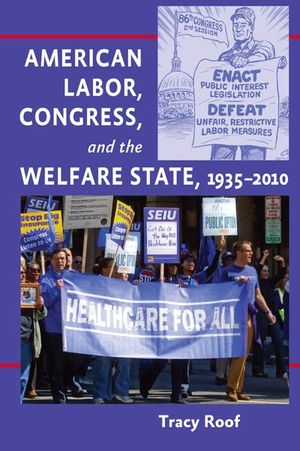American Labor, Congress, and the Welfare State, 1935–2010
Published by Johns Hopkins University Press
A study of the relationship between the U.S. Congress and the American labor movement over the course of a 75-year period.
Despite achieving monumental reforms in the United States such as the eight-hour workday, a federal minimum wage, and workplace health and safety laws, organized labor’s record on much of its agenda has been mixed. Tracy Roof’s sweeping examination of labor unions and the American legislative process explains how this came to be and what it means for American workers.
Tracing a 75-year arc in labor movement history, Roof discusses the complex interplay between unions and Congress, showing the effects of each on the other, how the relationship has evolved, and the resulting political outcomes. She analyzes labor’s success at passing legislation and pushing political reform in the face of legislative institutional barriers such as the Senate filibuster and an entrenched and powerful committee structure, looks at the roots and impact of the interdependent relationship between the Democratic Party and the labor movement, and assesses labor's prospects for future progress in creating a comprehensive welfare state. Roof’s original investigation details the history, actions, and consequences of major policy battles over areas such as labor law reform and health care policy. In the process, she brings to light practical and existential questions for labor leaders, scholars, and policy makers.
Although American labor remains a force within the political process, decades of steadily declining membership and hostile political forces pose real threats to the movement. Roof’s shrewd exploration of unions, Congress, and the political process challenges conventional explanations for organized labor’s political failings.
Despite achieving monumental reforms in the United States such as the eight-hour workday, a federal minimum wage, and workplace health and safety laws, organized labor’s record on much of its agenda has been mixed. Tracy Roof’s sweeping examination of labor unions and the American legislative process explains how this came to be and what it means for American workers.
Tracing a 75-year arc in labor movement history, Roof discusses the complex interplay between unions and Congress, showing the effects of each on the other, how the relationship has evolved, and the resulting political outcomes. She analyzes labor’s success at passing legislation and pushing political reform in the face of legislative institutional barriers such as the Senate filibuster and an entrenched and powerful committee structure, looks at the roots and impact of the interdependent relationship between the Democratic Party and the labor movement, and assesses labor's prospects for future progress in creating a comprehensive welfare state. Roof’s original investigation details the history, actions, and consequences of major policy battles over areas such as labor law reform and health care policy. In the process, she brings to light practical and existential questions for labor leaders, scholars, and policy makers.
Although American labor remains a force within the political process, decades of steadily declining membership and hostile political forces pose real threats to the movement. Roof’s shrewd exploration of unions, Congress, and the political process challenges conventional explanations for organized labor’s political failings.
BUY NOW FROM
COMMUNITY REVIEWS
